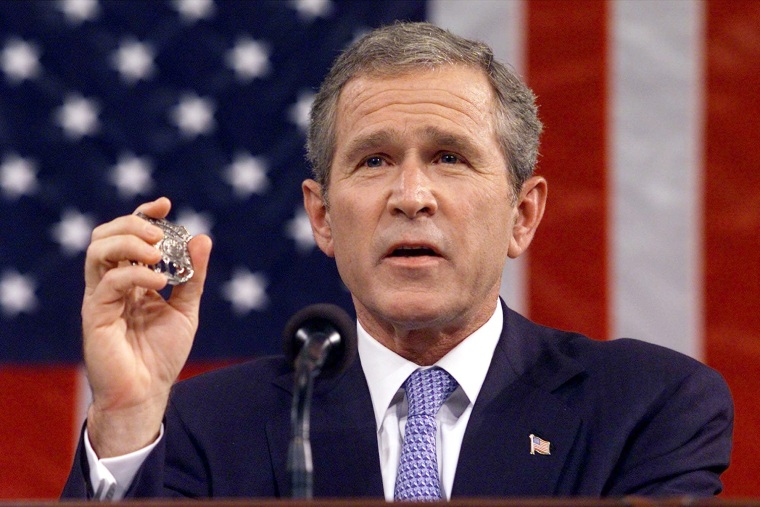WASHINGTON — Before and immediately after the 9/11 terrorist attacks, Americans were fairly optimistic about the direction of the country, they held relatively positive opinions about the two major political parties and believed the nation was united.
Twenty years later, however, more than 6-in-10 Americans think the country is on the wrong track, the two political parties both hold net-negative ratings, and almost everyone believes the nation is divided.
That’s according to NBC News polls and other surveys that were conducted before and right after 9/11, and what those same polls find today — after the wars in Iraq and Afghanistan, after increased political polarization and controversial presidencies, and after a deadly pandemic that’s divided Americans over issues like masks and vaccines.
In June 2001 — seven months after the Supreme Court's Bush v. Gore decision put George W. Bush into the White House — 43 percent of all Americans said the country was on the right track, versus 39 percent who said it was on the wrong track, according to that month’s national NBC News/Wall Street Journal poll.
Then in the poll after the 9/11 attacks, a whopping 72 percent said the nation was headed in the right direction, compared with just 11 percent who disagreed.
Today, those numbers are almost exactly reversed, with only 29 percent saying they think the country is on the right track, and 63 percent saying they believe it’s on the wrong track, per the August NBC News poll. (The Wall Street Journal is no longer a partner on the poll.)
Views of the two major political parties follow a similar pattern.
In June’s NBC/WSJ poll, Americans held net-positive ratings for both the Democratic Party (46 percent positive, 28 percent negative) and the Republican Party (43 percent positive, 35 percent negative).
Then in December 2001’s NBC/WSJ poll — just months after the 9/11 attacks — the ratings increased for both Democrats (48 percent positive, 23 percent negative) and Republicans (56 percent positive, 22 percent negative).
But today, both parties remain underwater — with the Democratic Party at 39 percent positive, 41 percent negative, and the Republican Party at 32 percent positive, 46 percent negative, per the April NBC News poll.
And when it comes to unity and division, 34 percent of Americans said the nation was united and in agreement about the most important values in the months before the attacks, versus 62 percent who said it was greatly divided on those values, according to a December 1998 Washington Post poll conducted during Bill Clinton’s impeachment.
The numbers flipped after 9/11 when a Gallup/CNN/USA Today survey asked that same question in November 2001: Seventy-four percent said the nation was in agreement, compared with 24 percent who said it was greatly divided.
When an Associated Press poll asked that same question this year, only 11 percent said Americans are united and in agreement about the most important values, while 88 percent of Americans said they were greatly divided.
Rudy Giuliani — then versus now
One final set of then-versus-now numbers from our NBC News poll: In the December 2001 NBC/WSJ poll, Rudy Giuliani — then in his last weeks as the mayor of New York — enjoyed a favorable/unfavorable rating of 84 percent positive, 2 percent negative, with Democrats, Republicans and independents all sharing similar views about him.
But in an October 2019 NBC/WSJ poll, Giuliani’s rating fell to 24 percent positive, 44 percent negative, with Republicans mostly supportive and with Democrats and independents mostly in opposition.
CORRECTION (Sept. 10, 2021, 9:25 a.m. ET): A previous version of this article misstated Rudy Giuliani's political status in December 2001. He was still the mayor of New York (until January 2002); he was not a former mayor.


